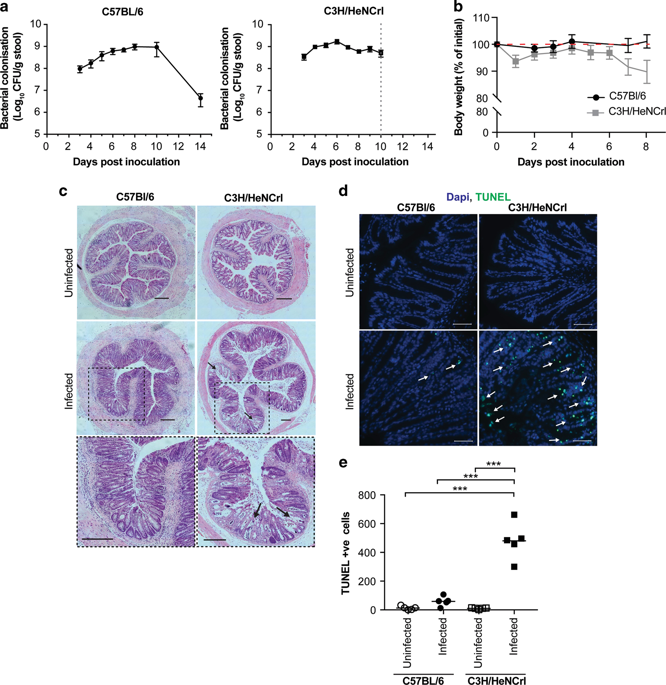Mucosal Immunology ( IF 8 ) Pub Date : 2019-11-26 , DOI: 10.1038/s41385-019-0235-4 Rachael Barry 1 , David Ruano-Gallego 1 , Shiva T Radhakrishnan 2, 3 , Scott Lovell 4 , Lu Yu 5 , Olga Kotik 1 , Izabela Glegola-Madejska 1 , Edward W Tate 4 , Jyoti S Choudhary 5 , Horace R T Williams 2, 3 , Gad Frankel 1

|
Given the global burden of diarrheal diseases on healthcare it is surprising how little is known about the drivers of disease severity. Colitis caused by infection and inflammatory bowel disease (IBD) is characterised by neutrophil infiltration into the intestinal mucosa and yet our understanding of neutrophil responses during colitis is incomplete. Using infectious (Citrobacter rodentium) and chemical (dextran sulphate sodium; DSS) murine colitis models, as well as human IBD samples, we find that faecal neutrophil elastase (NE) activity reflects disease severity. During C. rodentium infection intestinal epithelial cells secrete the serine protease inhibitor SerpinA3N to inhibit and mitigate tissue damage caused by extracellular NE. Mice suffering from severe infection produce insufficient SerpinA3N to control excessive NE activity. This activity contributes to colitis severity as infection of these mice with a recombinant C. rodentium strain producing and secreting SerpinA3N reduces tissue damage. Thus, uncontrolled luminal NE activity is involved in severe colitis. Taken together, our findings suggest that NE activity could be a useful faecal biomarker for assessing disease severity as well as therapeutic target for both infectious and chronic inflammatory colitis.
中文翻译:

粪便中性粒细胞弹性蛋白酶-抗蛋白酶平衡反映结肠炎的严重程度
鉴于腹泻病给医疗保健带来的全球负担,令人惊讶的是人们对疾病严重程度的驱动因素知之甚少。由感染和炎症性肠病 (IBD) 引起的结肠炎的特点是嗜中性粒细胞浸润到肠粘膜中,但我们对结肠炎期间嗜中性粒细胞反应的理解是不完整的。使用传染性(柠檬酸杆菌)和化学(葡聚糖硫酸钠;DSS)小鼠结肠炎模型以及人类 IBD 样本,我们发现粪便中性粒细胞弹性蛋白酶 (NE) 活性反映了疾病的严重程度。在C. rodentium感染肠上皮细胞分泌丝氨酸蛋白酶抑制剂SerpinA3N抑制和减轻细胞外NE引起的组织损伤。患有严重感染的小鼠产生的 SerpinA3N 不足以控制过度的 NE 活性。这种活动有助于结肠炎的严重程度,因为用产生和分泌 SerpinA3N 的重组啮齿类啮齿动物菌株感染这些小鼠会减少组织损伤。因此,不受控制的管腔 NE 活性与严重结肠炎有关。综上所述,我们的研究结果表明,NE 活性可能是一种有用的粪便生物标志物,可用于评估疾病的严重程度以及感染性和慢性炎症性结肠炎的治疗靶点。



























 京公网安备 11010802027423号
京公网安备 11010802027423号